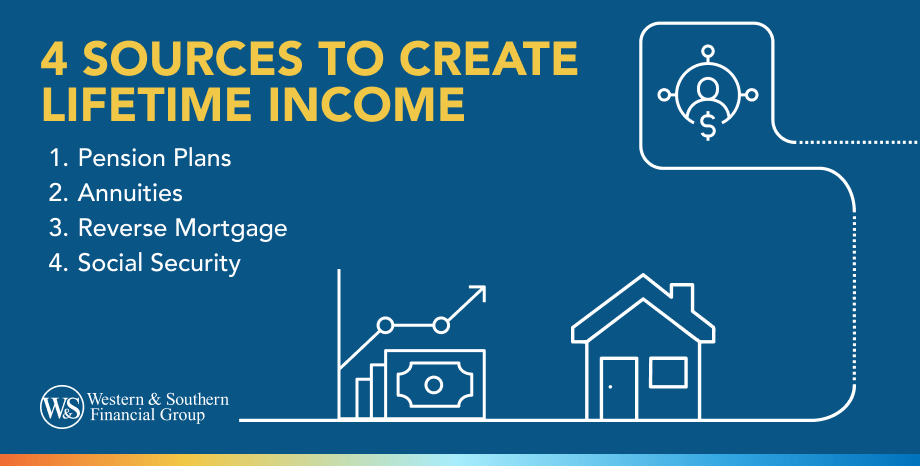

Key Takeaways
- Lifetime income sources ensure a steady stream of payments throughout retirement, mitigating the risk of running out of funds.
- Options include pension plans (defined benefit), annuities, reverse mortgages, and Social Security.
- Annuities provide customizable income streams, while reverse mortgages offer home equity-based income.
- Social Security offers government-guaranteed income, and strategic planning can optimize benefits for retirees.
When you stop working, you might also stop earning income. However, you'll continue to pay expenses for the rest of your life, so it's crucial to plan for how you'll cover those costs. That's why retirement income sources are such an important part of a financial plan. With a steady flow of funds coming in, you can help improve the chances of living comfortably in retirement.
Here's what to know about lifetime income and the different sources to consider while planning for retirement.
What Is Lifetime Income?
The most reliable income sources provide a stream of payments that lasts for the rest of your life — regardless of how long you live. As a result, you can avoid running out of money early, and you can budget for the future.
While you might have money saved in retirement accounts such as 401(k) plans and IRAs, spending from those accounts can be tricky. It's difficult to know how long the funds will last, and market volatility can cause your portfolio to lose value unexpectedly and quickly.
Once you leave your job, you won't actively be earning money. But it is possible to set up passive income streams and other funding sources that can help to cover expenses and build savings for the future.
4 Potential Sources of Lifetime Income
An important step toward planning for your future is calculating how much you need to retire. If you don't think your savings will stretch far enough to reach retirement, or you're uneasy about the possibility of running out of money after retiring, the four following options may help you reach your goals:
1. Pension Plans
If you're fortunate enough to have a pension plan — also referred to as a "defined benefit plan" — from your workplace, you can expect a stream of payments that lasts for your entire life. The payments typically depend on your income and tenure with your employer. In some cases, pension plans are quite generous. For example, the plan might offer to pay a substantial amount each month and continue to make payments for the rest of your life (and a spouse's life if you choose a survivor benefit and you die first).
Unfortunately, pension plans have become increasingly rare. These plans are often still available for government employees, such as firefighters and educators. However, private-sector employees are typically on their own, so they look to 401(k) plans and similar vehicles to help them save. Ultimately, whether or not you have access to a pension depends on your employer.
2. Annuities
If you don't have a pension plan at your job, you can create something very similar on your own with an annuity. Annuities are insurance contracts that include a variety of guarantees — including lifetime income.
When using an annuity, you can choose to have income for life and include a spouse's life as well. To arrange the payments, you typically pay a lump sum to an insurance company. The size of your regular payments depend on your age and the amount you put into the annuity. The older you are, the higher your payments will likely be, all else being equal.
A common challenge with annuities is the risk of early death. If you (and your spouse) die shortly after buying an annuity, the payments might stop — which could be fine if no one else is counting on that money. But if you want to pass assets on to beneficiaries, consider adding a period certain annuity or using deferred annuities with riders. This strategy may provide assets for loved ones after your death, depending on the circumstances.
To get set up with an annuity, speak with a financial professional who can help you design an income strategy.
A reverse mortgage can provide additional income during your retirement. Start Your Free Plan
3. Reverse Mortgages
If you have a substantial amount of equity in your home, a reverse mortgage — also referred to as a home equity conversion mortgage (HECM) — can provide extra income or a source for lump sum withdrawals. Unlike traditional mortgages that require you to make payments, reverse mortgages have no monthly payments. HECM loans usually offer borrower-friendly features.
You typically repay a reverse mortgage after your death, or after the last living borrower moves out of the home, through a sale of the property. With HECM loans, you're not responsible for making extra payments if you withdraw more than the home is worth. Instead, the lender recoups whatever is available after the sale of your home. If there is any money left after repaying the loan, you or your beneficiaries would get those assets.
4. Social Security
Social Security pays a modest retirement lifetime income to most workers. It's a government-guaranteed source of income, and it comes with spousal benefits and inflation adjustments. The amount you receive depends on your work history, and higher earnings generally lead to higher Social Security payments.
Social Security is helpful, but it probably won't cover all your expenses. You may need to supplement that income with other sources described above (or by taking withdrawals from savings).
As with pensions, you don't have much control over enrolling in Social Security — it depends on your job. However, you can choose when to start taking benefits, generally between age 62 and 70. The longer you wait, the higher your payments will be, and that choice may affect a survivor who takes over your income after death.
If you work for an employer that did not pay into Social Security during your working years, be aware that your Social Security benefits might be reduced by any pension income you receive.
The Bottom Line
It's critical to avoid running out of money in retirement. To improve your chances of success, consider retirement lifetime income sources that guarantee to continue paying for as long as you live. There are several options available, and each has pros and cons. That range of options is a good thing, and you can even use a combination of strategies to build a robust plan.
Ultimately, you can design a retirement income plan that helps you maintain the quality of life you want without the anxiety of depleting funds early. If you think you could benefit from having a financial professional take a look at your situation and offer personalized advice, don't hesitate to reach out for assistance.
Design a retirement plan with lifetime income options to avoid depleting funds early. Start Your Free Plan




























